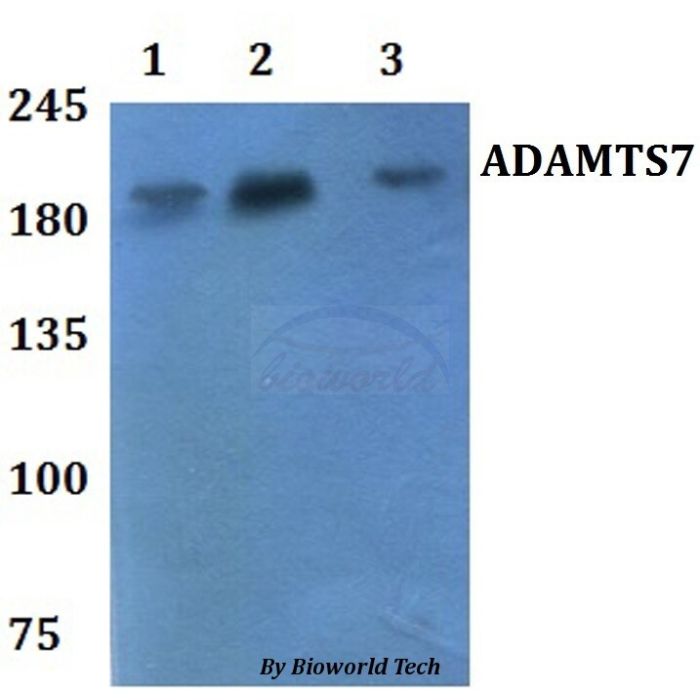ADAMTS7 polyclonal, anti-human, mouse, rat
€305.00
In stock
SKU
BS61127
Background:
ADAMTS (a disintegrin and metalloproteinase domain with thrombospondin type-1 modules) is a family of zinc-dependent proteases that are implicated in a variety of normal and pathological conditions, including arthritis and cancer. ADAMTS protein family members contain an N-terminal propeptide domain, a metalloproteinase domain, a disintegrin-like domain and a C-terminus that contains a varying number of thrombospondin type-1 (TSP-1) motifs. ADAMTS genes are primarily expressed in fetal tissues, including lung, kidney and liver. ADAMTS-7 (ADAM metallopeptidase with thrombospondin type 1 motif, 7), also known as COMPase, is a 1,686 amino acid protein that exists as two alternatively spliced isoforms. Encoded by a gene that maps to human chromosome 15q25.1, ADAMTS-7 contains eight TSP-1 motifs and binds one zinc ion per subunit. ADAMTS-7 is expressed in heart, brain, placenta, lung, liver, skeletal muscle, kidney and pancreas. ADAMTS-7 is also located in meniscus, bone, tendon, cartilage, synovium, fat and ligaments, and is up-regulated in articular cartilage and synovium in arthritis patients. ADAMTS-7 functions as a metalloprotease and may play a role in the degradation of COMP. ADAMTS-7 is pH dependent, with optimum pH between 7.5 and 9.5.
Alternative Name:
A disintegrin and metalloproteinase with thrombospondin motifs 7 (EC:3.4.24.-), ADAM-TS 7, ADAM-TS7, ADAMTS-7, COMPase, ADAMTS7
Application Dilution: WB: 1:500~1:1000
Specificity: ADAMTS7 polyclonal antibody detects endogenous levels of ADAMTS7 protein.
Immunogen:
A synthetic peptide corresponding to residues in Human ADAMTS7.
MW: ~ 184 kDa
Swis Prot.: Q9UKP4
Purification & Purity:
The antibody was affinity-purified from rabbit antiserum by affinity-chromatography using epitope-specific immunogen and the purity is > 95% (by SDS-PAGE).
Format:
1 mg/ml in Phosphate buffered saline (PBS) with 0.05% sodium azide, approx. pH 7.3.
Storage:
Store at 4°C short term. Aliquot and store at -20°C long term. Avoid freeze-thaw cycles.
For research use only, not for use in diagnostic procedure.
ADAMTS (a disintegrin and metalloproteinase domain with thrombospondin type-1 modules) is a family of zinc-dependent proteases that are implicated in a variety of normal and pathological conditions, including arthritis and cancer. ADAMTS protein family members contain an N-terminal propeptide domain, a metalloproteinase domain, a disintegrin-like domain and a C-terminus that contains a varying number of thrombospondin type-1 (TSP-1) motifs. ADAMTS genes are primarily expressed in fetal tissues, including lung, kidney and liver. ADAMTS-7 (ADAM metallopeptidase with thrombospondin type 1 motif, 7), also known as COMPase, is a 1,686 amino acid protein that exists as two alternatively spliced isoforms. Encoded by a gene that maps to human chromosome 15q25.1, ADAMTS-7 contains eight TSP-1 motifs and binds one zinc ion per subunit. ADAMTS-7 is expressed in heart, brain, placenta, lung, liver, skeletal muscle, kidney and pancreas. ADAMTS-7 is also located in meniscus, bone, tendon, cartilage, synovium, fat and ligaments, and is up-regulated in articular cartilage and synovium in arthritis patients. ADAMTS-7 functions as a metalloprotease and may play a role in the degradation of COMP. ADAMTS-7 is pH dependent, with optimum pH between 7.5 and 9.5.
Alternative Name:
A disintegrin and metalloproteinase with thrombospondin motifs 7 (EC:3.4.24.-), ADAM-TS 7, ADAM-TS7, ADAMTS-7, COMPase, ADAMTS7
Application Dilution: WB: 1:500~1:1000
Specificity: ADAMTS7 polyclonal antibody detects endogenous levels of ADAMTS7 protein.
Immunogen:
A synthetic peptide corresponding to residues in Human ADAMTS7.
MW: ~ 184 kDa
Swis Prot.: Q9UKP4
Purification & Purity:
The antibody was affinity-purified from rabbit antiserum by affinity-chromatography using epitope-specific immunogen and the purity is > 95% (by SDS-PAGE).
Format:
1 mg/ml in Phosphate buffered saline (PBS) with 0.05% sodium azide, approx. pH 7.3.
Storage:
Store at 4°C short term. Aliquot and store at -20°C long term. Avoid freeze-thaw cycles.
For research use only, not for use in diagnostic procedure.
| Is Featured? | No |
|---|
Write Your Own Review

